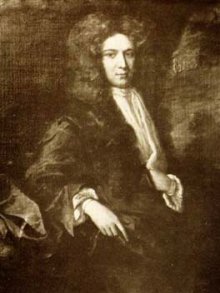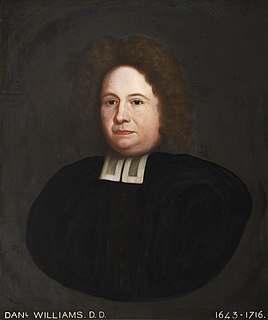Related Research Articles

Anthony Collins was an English philosopher, and a proponent of deism.

John Toland was an Irish rationalist philosopher and freethinker, and occasional satirist, who wrote numerous books and pamphlets on political philosophy and philosophy of religion, which are early expressions of the philosophy of the Age of Enlightenment. Born in Ireland, he was educated at the universities of Glasgow, Edinburgh, Leiden and Oxford and was influenced by the philosophy of John Locke.

Edward Stillingfleet was a British Christian theologian and scholar. Considered an outstanding preacher as well as a strong polemical writer defending Anglicanism, Stillingfleet was known as "the beauty of holiness" for his good looks in the pulpit, and was called by John Hough "the ablest man of his time".
John Norris, sometimes called John Norris of Bemerton (1657–1712), was an English theologian, philosopher and poet associated with the Cambridge Platonists.

White Kennett was an English bishop and antiquarian. He was educated at Westminster School and at St Edmund Hall, Oxford, where, while an undergraduate, he published several translations of Latin works, including Erasmus' In Praise of Folly.

Edward Wells (1667–1727) was an English mathematician, geographer, and controversial theologian.
The Reverend Thomas Pyle was a Church of England clergyman and religious controversialist.
Sir Richard Cox, 1st Baronet PC was an Irish lawyer and judge. He served as Chief Justice of the Common Pleas for Ireland from 1701 to 1703, Lord Chancellor of Ireland from 1703 to 1707 and as Lord Chief Justice of the Queen's Bench for Ireland from 1711 to 1714.

Daniel Williams was a British benefactor, minister and theologian, within the Presbyterian tradition, i.e. a Christian outside the Church of England. He is known largely for the legacy he left which led to the creation of Dr Williams's Library, a centre for research on English Dissenters.
Robert Parker (c.1564–1614) was an English Puritan clergyman and scholar. He became minister of a separatist congregation in Holland where he died while in exile for his heterodoxy. The Revd. Cotton Mather wrote of Parker as "one of the greatest scholars in the English Nation, and in some sort the father of all Nonconformists of our day."
Joseph Boyse was an English presbyterian minister in Ireland, and controversialist.
Thomas Bennet (1673–1728) was an English clergyman, known for controversial and polemical writings, and as a Hebraist.

William Nicholls (1664–1712) was an English clergyman and theologian, known as an author on the Book of Common Prayer.

James Peirce (1674?–1726) was an English dissenting minister, the catalyst for the Salter's Hall controversy.
Samuel Eaton (1596?–1665) was an English independent divine.
James Kirkwood was a Church of Scotland minister, advocate of free parish libraries, and promoter of Scottish Gaelic language literacy. He was behind the Bible translations into Scottish Gaelic of Robert Kirk.
William Burscough was an eighteenth-century English Anglican priest.
George Trosse (1631–1713) was an English nonconformist minister. He is best known for his autobiographical accounts of periods of mental illness he experienced in his younger years.
Sir John Ward, of Hookfield, Clay Hill, Epsom, Surrey and St Laurence Pountney, London, was a British merchant, banker and politician who sat in the House of Commons between 1701 and 1726. He was an original Governor of the Bank of England and served as Lord Mayor of London in 1718.
Henry Gandy (1649–1734) was an English non-juring bishop.
References
- ↑ E Vallance, ‘Burscough, Robert (1650/51–1709)’, ODNB, OUP, 2004 accessed 15 July 2013
- ↑ ” Letters on Various Subjects, Literary, Political and Ecclesiastical, Volume 1” Nicolson,W (Ed): London, John Nicols, 1809
Bibliography
- Vallance, Edward (2004). "Burscough, Robert (1650/51–1709)". Oxford Dictionary of National Biography. Oxford University Press. Retrieved 15 July 2013.CS1 maint: discouraged parameter (link)